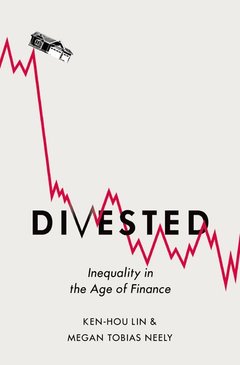Description
Divested
Inequality in Financialized America
Authors: Lin Ken-Hou, Neely Megan Tobias
Language: English
Subjects for Divested:
Approximative price 32.87 €
In Print (Delivery period: 14 days).
Add to cart
Publication date: 01-2020
288 p. · 16x23.8 cm · Hardback
288 p. · 16x23.8 cm · Hardback
Description
/li>Biography
/li>
Finance has become an inescapable part of American life. From how one pursues an education, purchases a home, runs a business, or saves for retirement, finance orders the lives of ordinary Americans. And as finance expanded, inequality soared. In Divested, Ken-Hou Lin and Megan Tobias Neely demonstrate why widening inequality cannot be understood without examining the rise of big finance. Lin and Neely provide systematic evidence to document how the ascendance of finance on Wall Street, Main Street, and in the home is a fundamental cause of economic inequality. They argue that finance has reshaped the economy in three important ways: the financial sector and its practices create unproductive intermediaries that extract resources without providing economic benefits; the increasing involvement of non-finance firms in financial services and investment markets weakens the demand for labor and the bargaining power of workers; and the increasing consumption of financial products by households shifts risks and uncertainties once shouldered by unions, corporations, and governments to families. The growth of the financial sector represents a dramatic change in how the American economy distributes resources away from workers and families toward private enterprise. The average American is now divested from a world driven by the logic of finance and the maximization of profit. A clear, comprehensive, and convincing account of the forces driving economic inequality in America, Divested warns us that the most damaging consequence of the expanding financial system is not simply recurrent financial crises but a widening social divide between the have and have-nots.
Ken-Hou Lin is Associate Professor of Sociology at the University of Texas at Austin. Megan Tobias Neely is a Postdoctoral Fellow in Sociology at Stanford University's Michelle R. Clayman Institute for Gender Research.
© 2024 LAVOISIER S.A.S.




